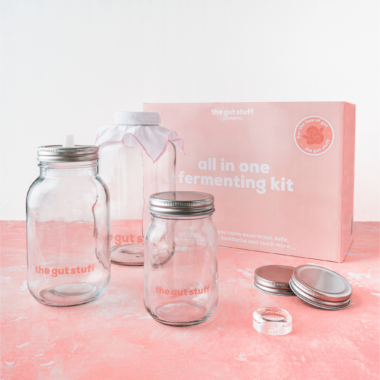
We’ve asked our team of experts to help us answer some of the many questions you asked around gut health…
what do you need to eat to have a healthy gut?
Variety is key! You have trillions of bacteria in your gut and they all thrive on different foods. The current research shows we need around 30 different types of plant based foods a week – I know it sounds like a lot, but this isn’t just fruit and vegetables, it’s also wholegrains, pulses, legumes, nuts and seeds.
The best approach is to start by trying a new fruit and veg each week – to make this more manageable don’t forget about frozen fruits and veggies too. Our other top tips include always opting for mixed bags e.g. mixed seeds, mixed nuts, mixed grains etc. As well as trying different herbs and spices – you’ll find they all soon add up!
By including a wide variety of plant based foods, you’ll find your fibre intake will naturally increase – something a lot of us need.
*top tip – where you can leave the skins on your fruits and veggies, think carrots, kiwis etc.
Whilst we always focus on what you can add into your diet, limiting the amount of ultra processed foods you consume is also important – try making some simple swaps so you don’t feel you’re missing out whilst showing your gut some love!
Read more on plants and the microbiome…
is there anything that can help IBS symptoms?
There are plenty of lifestyle changes you can consider to help manage your symptoms, the effectiveness will vary from person to person, try them out and find out what works best for you:
- Movement – simply walking or stretching, and twists in yoga can be particularly helpful in alleviating bloating.
- Sleep – this is when your body rests and rebuilds so ensuring you’re getting enough quality sleep is important.
- Mindful eating – where possible avoid sitting in front of screens whilst eating, think about chewing your food thoroughly and slowly, all of this will aid in the digestive process.
- Peppermint oil capsules – can be particularly effective for some in relaxing the gut, and easing any bloating or cramping.
- Clothing – try to avoid tight waistbands, as they can often lead to uncomfortable bloating, especially during/after a meal.
- Stress management – although it’s unlikely to be the sole trigger for your symptoms, stress is known to exacerbate symptoms. If this sounds like you try to incorporate some stress management techniques like breathwork, mindfulness, yoga/movement, journaling, talking to a loved one – whatever works for you.
- Last but not least – dietary – many people find certain foods can trigger or worsen their symptoms, common ones include onions and garlic, therefore it may be that you need to include less or more of certain foods to help manage your symptoms. In this case it’s best to work with a healthcare professional to safely identify your triggers/any dietary changes and manage the process.
can you develop IBS symptoms long after a bout of gastroenteritis caused by food?
There isn’t one single cause for IBS, however one of the most well-known is suffering from gastroenteritis. Your risk of developing IBS has been found to be over 4x greater if you’ve had a gut infection in the past year, with further research finding you remain at an elevated risk for at least 2-3 years post-infection.
If you’re suffering with IBS-like symptoms for an extended period of time, it’s definitely worth checking in with your GP, to get diagnosed, rule out any other causes and help with any treatment and symptom management – you don’t have to suffer in silence.
probiotics give me gas, why is that?
You’re not alone – many people (although not everyone) have reported gas and bloating in the first couple of weeks of taking a probiotic. Our microbiome is always changing, if you suddenly introduce a new bacteria to this environment, even if it’s a good bacteria – your microbiome may need time to adjust.
Try lowering your daily intake and gradually build back up to the recommended dose. If the symptoms persist, it could be worth visiting a healthcare professional – in this case you may need to stop taking the probiotic you’re currently on and find one with targeted strains that meet your specific digestive needs.
Read more on pre and probiotics…
best things for fighting gut infections?
Gastrointestinal infections can be caused by a number of bacteria, viruses and parasites. Catching them can sometimes be unavoidable, but by practising good hygiene and taking extra precautions when travelling abroad you can reduce your risk of catching one.
When you are unlucky and do catch one, most importantly stay hydrated, and visit a healthcare professional if your symptoms do persist.
We know now, our gut bacteria helps to maintain a balanced immune system, in fact 70% of the entire immune system resides in the gut. Whilst most bacteria are beneficial, as outlined some can make us unwell. An unhealthy microbiota looks different in everyone, but the one thing it does have in common is a lack of diversity. Having a diverse microbiota means it is more likely to bounce back from outside intruders, so keep showing your gut some love – infection or no infection.
Read more on gut health and immunity…
can other health issues (PCOS, etc.) impact gut health? How do I fix it?
Your gut and its community of microbes are powerful and influence pretty much all aspects of physical and mental health, from how well we metabolise certain foods to how we sleep. Other health issues may impact gut health and vice versa.
Specifically for PCOS, studies have found people with PCOS have less diverse gut bacteria. With further studies finding those with PCOS may have a higher prevalence of IBS.
There are a multitude of lifestyle changes you can make that will both help improve the symptoms of PCOS and your gut health. These include eating a varied diet with lots of plant based foods, managing your stress and making sure you’re getting a good nights sleep.
does frequent cystitis and thrush mean I have bad gut health?
Thrush is caused by an overgrowth of the fungus/yeast called candida, which grows all over the human body, especially in warm, moist areas like the mouth, vagina and you guessed it the stomach.
The risk of developing this is higher in those of use who may have an; imbalance of bacteria in the gut, high-stress levels or have used antibiotics for a prolonged period (amongst other things).
Symptoms of a candida overgrowth specifically in the gut may include stomach pain, diarrhoea, constipation, bloating, gas or nausea.
These symptoms do overlap with a variety of gut issues, therefore it’s important to see your doctor to rule out other medical conditions, and see whether you do have a candida overgrowth, and any link with your gut.
Read more on different gut health conditions…





